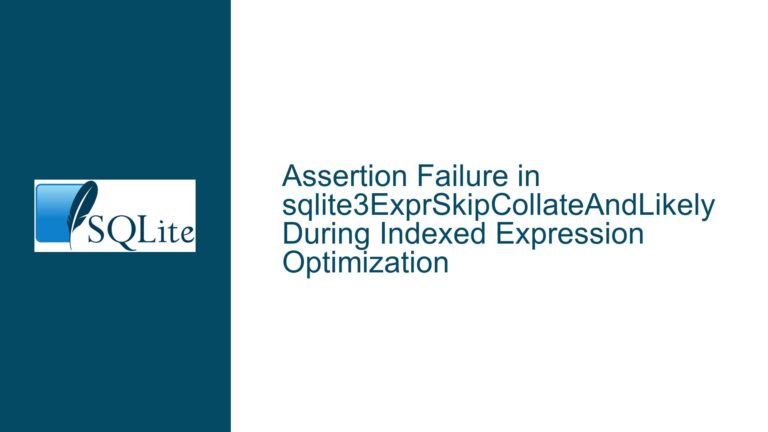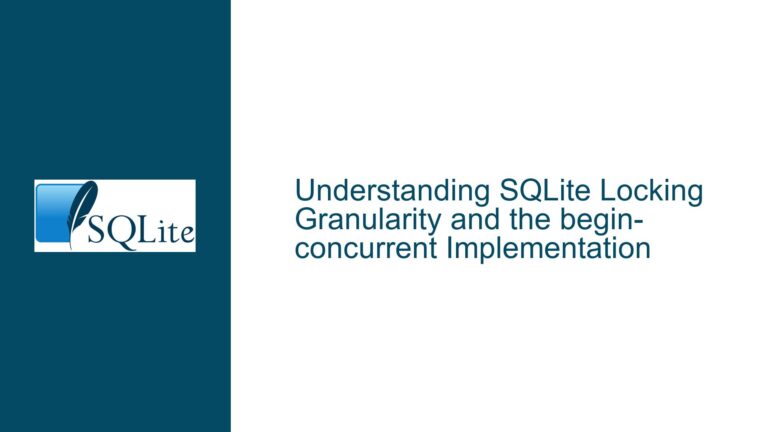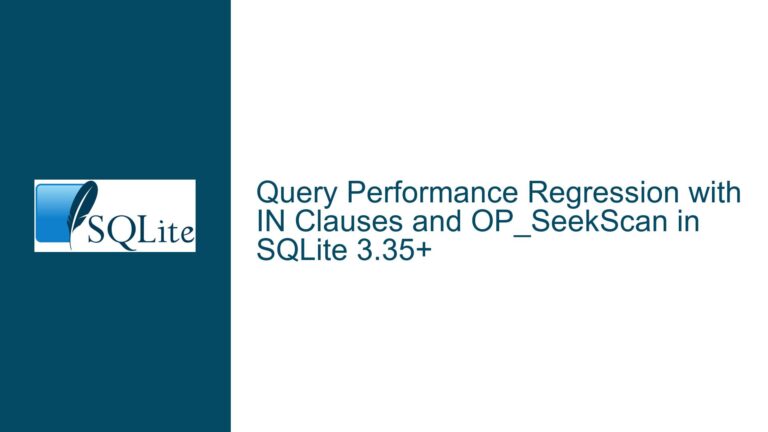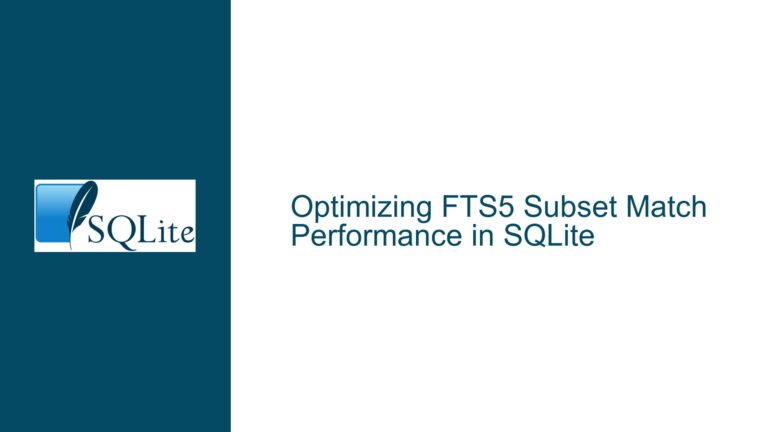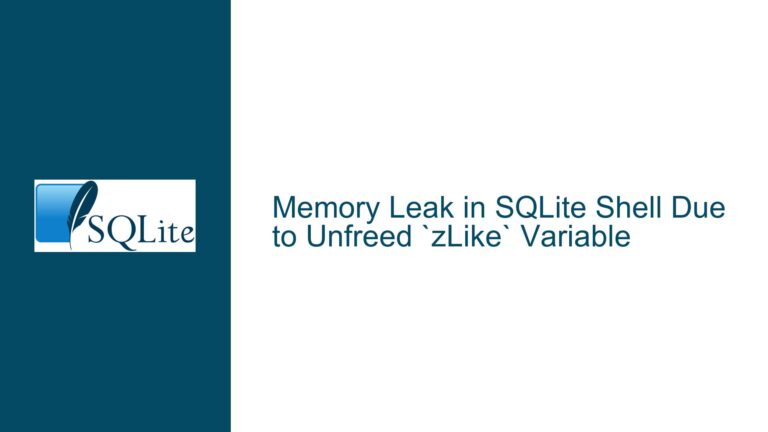Excessive Callback Invocations in SQLite Integrity Check on Large Databases
Understanding the Performance Degradation in SQLite’s integrity_check on Large Databases
The core issue revolves around the integrity_check function in SQLite, which is designed to verify the structural integrity of a database. In normal scenarios, this function operates efficiently, even on moderately large databases. However, in specific cases involving very large databases (e.g., 50GB or more), the integrity_check function exhibits severe performance degradation, leading to excessive invocations of the progress callback. This results in the function taking an inordinate amount of time to complete—sometimes up to 15 hours—compared to the expected runtime of around 30 minutes. The problem is exacerbated when the database grows in size, and deleting a small portion of the data (e.g., 5%) significantly improves the performance of the integrity_check.
The issue is not universal but has been observed in isolated cases, suggesting that it may be triggered by specific conditions within the database schema, data distribution, or SQLite configuration. The problem manifests as an apparent infinite loop during the execution of integrity_check, where the progress callback is invoked billions of times, causing the process to read terabytes of data without completing. This behavior is particularly puzzling because the same database, when recreated from scratch, does not exhibit the same issue, indicating that the problem is not inherent to the database’s size or content but rather to its state or configuration.
Potential Causes of the Excessive Callback Invocations
Several factors could contribute to the excessive callback invocations and the subsequent performance degradation in the integrity_check function. One possible cause is the interaction between the progress callback mechanism and the internal state of the SQLite database engine. The progress callback is designed to allow the application to monitor the progress of long-running operations and potentially abort them if necessary. However, in this case, the callback is being invoked far more frequently than expected, suggesting that the internal logic governing when the callback is called may be flawed under certain conditions.
Another potential cause is the configuration settings used with SQLite. The settings provided in the discussion include a large cache size (PRAGMA cache_size=50000), which could lead to excessive memory usage and inefficient disk I/O patterns during the integrity check. Additionally, the use of PRAGMA temp_store=MEMORY forces temporary tables and indices to be stored in memory, which, while generally beneficial for performance, could lead to resource exhaustion or inefficient behavior in very large databases. The combination of these settings, along with the specific characteristics of the database, might create a scenario where the integrity_check function enters a state of continuous thrashing, repeatedly reading and processing the same data without making progress.
A third potential cause is a bug or edge case in the SQLite engine itself. The fact that the issue only occurs in specific databases and is resolved by recreating the database from scratch suggests that there may be a subtle bug in the way SQLite handles certain database states or configurations. This bug could be related to the handling of large databases, the interaction between the progress callback and the internal state of the database engine, or the specific implementation of the integrity_check function. The issue might also be related to the way SQLite manages its page cache, particularly in scenarios where the database is too large to fit entirely in memory, leading to excessive disk I/O and inefficient processing.
Diagnosing and Resolving the Excessive Callback Invocations
To diagnose and resolve the issue, a systematic approach is required. The first step is to ensure that the SQLite library is up to date. As noted in the discussion, updating to the latest version of SQLite resolved the issue in one case, suggesting that the problem may have been caused by a bug that was subsequently fixed. Therefore, before proceeding with any further investigation, it is essential to verify that the application is using the most recent version of SQLite.
If updating SQLite does not resolve the issue, the next step is to analyze the database and the specific configuration settings used. This involves examining the database schema, the distribution of data, and the SQLite configuration parameters to identify any potential sources of inefficiency. For example, the use of a large cache size (PRAGMA cache_size=50000) should be evaluated to determine whether it is appropriate for the size of the database and the available system resources. Similarly, the use of PRAGMA temp_store=MEMORY should be reconsidered, particularly if the database is too large to fit entirely in memory, as this could lead to excessive memory usage and inefficient disk I/O patterns.
Another important step is to monitor the behavior of the integrity_check function in detail. This can be done by enabling debugging output in SQLite (e.g., by building SQLite with ./configure --enable-debug) and using the .eqp trace command in the SQLite CLI to trace the execution of the integrity_check function. This will provide detailed information about the internal operations performed by SQLite during the integrity check, allowing for the identification of any loops or inefficiencies in the process.
If the issue persists, it may be necessary to modify the application code to reduce the frequency of progress callback invocations. This can be achieved by increasing the interval at which the progress callback is called or by optimizing the callback function itself to minimize its overhead. Additionally, the use of alternative integrity checking methods, such as PRAGMA quick_check, should be considered, particularly if the primary goal is to identify major structural issues in the database rather than performing a comprehensive check of all indexes and data.
Finally, if all else fails, the database may need to be recreated from scratch. While this is a drastic measure, it has been shown to resolve the issue in some cases, suggesting that the problem may be related to the specific state or configuration of the database. Recreating the database ensures that it is in a clean, optimized state, free from any potential corruption or inefficiencies that could be causing the excessive callback invocations.
In conclusion, the excessive callback invocations in SQLite’s integrity_check function on large databases are a complex issue that can be caused by a variety of factors, including configuration settings, database state, and potential bugs in the SQLite engine. By systematically diagnosing and addressing these factors, it is possible to resolve the issue and restore the performance of the integrity_check function to acceptable levels.

